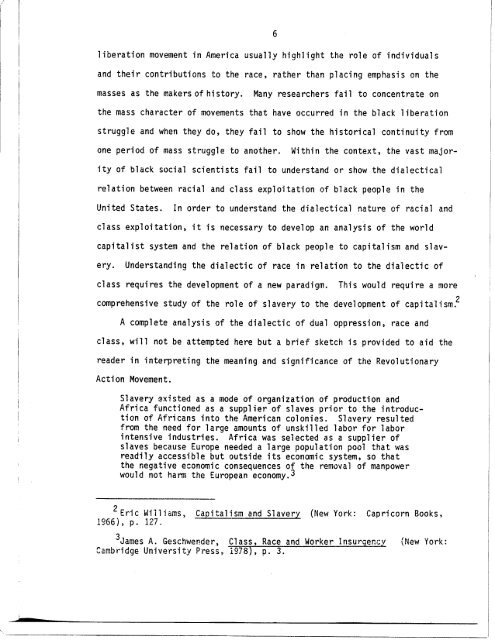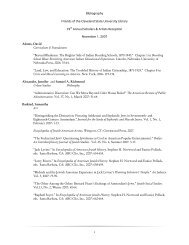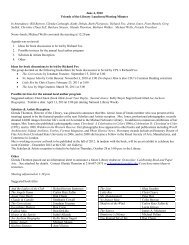- Page 1 and 2: REVOLUTIONARY ACTION MOVEMENT (RAM)
- Page 3 and 4: TABLE OF CONTENTS Chapter I . INTRO
- Page 5 and 6: 2 the black movement in the 1960's
- Page 7: 4 Therefore, the historical backgro
- Page 11 and 12: independent black nation . 5 Slave
- Page 13 and 14: into urban centers gave rise to nat
- Page 15 and 16: 12 ideology of world black revoluti
- Page 17 and 18: 14 The protracted war of national l
- Page 19 and 20: evolution is the central theme in G
- Page 21 and 22: 1 8 precipitious action, to attack
- Page 23 and 24: 20 Nationalist Movement as a whole
- Page 25 and 26: 2 2 dictatorship . This led to an e
- Page 27 and 28: 2 4 Also, Latin America went throug
- Page 29 and 30: '6 b . the transition period, 1964-
- Page 31 and 32: 28 The racism black soldiers faced
- Page 33 and 34: York City, Garveyites attacked whit
- Page 35 and 36: 3 2 Part of the ABB's program was o
- Page 37 and 38: 34 struggle for clarity (direction)
- Page 39 and 40: 36 Angelo Herndon, a Negro Communis
- Page 41 and 42: 38 its members told to join the Nat
- Page 43 and 44: 40 At its inception the CP attacked
- Page 45 and 46: 42 the Montgomery Improvement Assoc
- Page 47 and 48: 44 The student leaders decided to r
- Page 49 and 50: 46 first lieutenant, Elijah Karriem
- Page 51 and 52: 48 publicizing the infamous "Kissin
- Page 53 and 54: 50 because of their centrality to t
- Page 55 and 56: 52 a tactic for people in the Third
- Page 57 and 58: 54 Indians in Uruguay . The Tupamar
- Page 59 and 60:
56 In Argentina, the Revolutionary
- Page 61 and 62:
58 conversative leaders in the civi
- Page 63 and 64:
60 the most powerful military compl
- Page 65 and 66:
62 There are various accounts of th
- Page 67 and 68:
64 inciting to riot . As a result o
- Page 69 and 70:
66 position of supporting Martin Lu
- Page 71 and 72:
68 coast RAM leadership . Plans wer
- Page 73 and 74:
7 0 Mao goes on to state that it is
- Page 75 and 76:
72 protracted . Guillen states : Wh
- Page 77 and 78:
CHAPTER FOUR EMERGENCE OF RAM The i
- Page 79 and 80:
76 Freeman sent letters to the Chal
- Page 81 and 82:
78 Philadelphia . One acquaintance
- Page 83 and 84:
80 a series of ideological discussi
- Page 85 and 86:
82 mass movement . 9 Queen Mother A
- Page 87 and 88:
84 The demonstration was scheduled
- Page 89 and 90:
86 dance . They called for support
- Page 91 and 92:
88 Philadelphia voted with Freeman,
- Page 93 and 94:
90 The leadership of the national o
- Page 95 and 96:
92 Cleage's terms, a "strategy of c
- Page 97 and 98:
94 James Foreman violently opposed
- Page 99 and 100:
were killed, eighty beaten, thirty-
- Page 101 and 102:
98 into armed self-defense . It was
- Page 103 and 104:
100 Executive Secretary . . . . . .
- Page 105 and 106:
102 Information Agency (USIA) . The
- Page 107 and 108:
104 a force which he had not develo
- Page 109 and 110:
10 6 to go to the University of Al-
- Page 111 and 112:
CHAPTER FIVE THE RAM ORGANIZATION T
- Page 113 and 114:
All recruitment into the organizati
- Page 115 and 116:
and to purge the black community of
- Page 117 and 118:
In response to the U .S . increasin
- Page 119 and 120:
influence in northern black communi
- Page 121 and 122:
was a short lived group because of
- Page 123 and 124:
120 The Black Panther Party was est
- Page 125 and 126:
12 2 Brother G ., an ex-Black Panth
- Page 127 and 128:
12 4 cadre that would aid the vangu
- Page 129 and 130:
126 mean attempting to unite all se
- Page 131 and 132:
128 one hundred cities protesting t
- Page 133 and 134:
130 RAM leadership . Also, new forc
- Page 135 and 136:
132 most important thing in that pe
- Page 137 and 138:
134 Eleven members of the RNA inclu
- Page 139 and 140:
136 began to ask how to go about jo
- Page 141 and 142:
138 in-glove with the corporation,
- Page 143 and 144:
140 But DRUM Learned that in order
- Page 145 and 146:
142 it supported black candidates w
- Page 147 and 148:
14 4 In the meeting, it was analyze
- Page 149 and 150:
146 racist . Reform was impossible
- Page 151 and 152:
148 this position . These cautious
- Page 153 and 154:
15 0 This ideology was placed in a
- Page 155 and 156:
152 they were ahead of the masses p
- Page 157 and 158:
154 The captive nation status of bl
- Page 159 and 160:
156 that a historical lesson was of
- Page 161 and 162:
158 and could become a "political M
- Page 163 and 164:
160 RAM's view of revolution in tha
- Page 165 and 166:
16 2 youth would lead the organizin
- Page 167 and 168:
164 must be organized as well . The
- Page 169 and 170:
166 enslaved . The fact that the U
- Page 171 and 172:
168 The international program of RA
- Page 173 and 174:
17 0 true aspirations for self-dete
- Page 175 and 176:
172 One could make a fairly strong
- Page 177 and 178:
17 4 to wage a war of self-defense
- Page 179 and 180:
CHAPTER SEVEN RESPONSE OF THE STATE
- Page 181 and 182:
17 8 various military intelligence
- Page 183 and 184:
180 4 . Prevent militant Black Nati
- Page 185 and 186:
182 Intelligence information was ga
- Page 187 and 188:
184 "neutralize" him as an effectiv
- Page 189 and 190:
186 Malcolm X's break from the nati
- Page 191 and 192:
188 While the search of the first f
- Page 193 and 194:
190 country were arrested on variou
- Page 195 and 196:
192 block . Us, in a carload, would
- Page 197 and 198:
194 Churches that permitted the Pan
- Page 199 and 200:
196 the black liberation movement .
- Page 201 and 202:
198 system and its failure to inves
- Page 203 and 204:
200 The Revolutionary Action Moveme
- Page 205 and 206:
202 of the economic gains black peo
- Page 207 and 208:
APPENDIX A : Selected RAM Documents
- Page 209 and 210:
206 This can be done by telling fri
- Page 211 and 212:
208 rights leaders with the nationa
- Page 213 and 214:
210 it meant to black people . His
- Page 215 and 216:
21 2 To be read or given to Afro-Am
- Page 217 and 218:
214 THE CODE OF THE REVOLUTIONARY N
- Page 219 and 220:
APPENDIX B : BLACK GUARD DOCUMENTS
- Page 221 and 222:
218 know that we have been fighting
- Page 223 and 224:
220 1965, August Black Vanguard, Vo
- Page 225 and 226:
22 2 BIBLIOGRAPHY Ahmad,Muhummad Ak
- Page 227 and 228:
22 4 Cluster, Dick . "The Borning S
- Page 229 and 230:
226 Henderson, Jeff . "A Philip Ran
- Page 231 and 232:
228 . Marxism and Black Radicalism
- Page 233 and 234:
23 0 Sobel, Lester A ., ed . Politi








